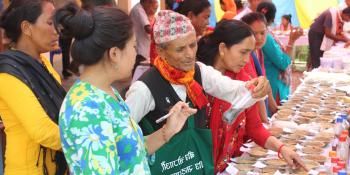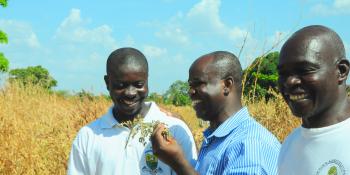Decarbonizing Costa Rica’s agriculture sector: diverse stakeholders embedded into scenarios process

Scenario-guided planning was used to generate a long-term vision in Costa Rica that would stimulate decarbonization of the agriculture and livestock sectors.
Prompted by the armed conflicts of its Central American neighbours, Costa Rica is still known all over the world for its decision in the 1940s to completely demilitarise. With an uncertain future under climate change, the country of only five million is now taking bold steps to become a model of decarbonisation: going above and beyond the emission reduction goals set out in the 2015 Paris Agreement, it is aiming for a carbon-neutral economy by 2021.
Following its ratification of the Paris Agreement, Costa Rica’s Ministry of Agriculture and Livestock (MAG) and Ministry of Environment and Energy (MINAE) were quick to begin drafting a joint agreement to stimulate gradual decarbonization of the agriculture and livestock sectors. Formulated using future scenarios developed in collaboration with the CCAFS Scenarios Project and Costa Rica’s University for International Cooperation (UCI), the agreement was signed by the two ministries at the beginning of February 2018.

Costa Rica's Ministers of Agriculture and Environment sign an agreement to decarbonize the country's agriculture. Photo: Vicky Cajiao
The added value of using future scenarios in a development process
Instead of merely focusing on the amount of emissions that must be reduced, the MAG and MINAE considered the formulation of this agreement an opportunity to reflect upon the conditions needed to shift towards an economy where a resilient, low carbon agricultural and livestock sector is the established norm. Experts from research organizations, the private sector and representatives from the MAG explored different accounts of changes in consumer demands, the adoption of technology by farmers, as well as the capacity of the state to support farmers in the transformation process during the creation of four different but plausible future scenarios. They then came together to create a long-term vision and recommendations for the transformation of the sector, ensuring they were robust in the face of the challenges posed by each scenario.
to reach their ambitious goal, the significant role of the private sector in Costa Rica’s agriculture and livestock sector cannot be ignored
The involvement of a diverse range of stakeholders is a hallmark of participatory anticipation processes such as future scenarios. The Costa Rican ministries involved in this process firmly believe that in order to reach their ambitious goal, the significant role of the private sector in Costa Rica’s agriculture and livestock sector cannot be ignored. High-emissions agricultural corporations were thus embedded in the process and included in the creation of the long-term vision and recommendations—a significant outcome for the scenario-guided planning process.
Questioning the role of different stakeholders in a scenario process
Climate change-vulnerable developing and middle income countries are increasingly seeking to use foresight methods such as future scenarios to guide their adaptation and mitigation planning. However, there is currently a lack of understanding of foresight as a political intervention. Who is and is not involved? Who is affected? What discourses and modes of thinking are promoted through foresight, and what is ignored or marginalized?
The Re-imagining anticipatory climate governance in the world's vulnerable regions (RE-IMAGINE) project will build on the CCAFS Future Scenarios project to address such questions and investigate ways in which foresight approaches can play a role in appropriate and effective modes of anticipatory climate governance in the world’s most vulnerable regions. Made possible by the BNP Paribas Foundation’s ‘Climate Action Call’, the project is led by Utrecht University’s Copernicus Institute for Sustainable Development with Wageningen University & Research, the University of Oxford and the CCAFS Future Scenarios Project as project partners. Regional partners such as UCI play a vital role in the project implementation.
Interested in policies and priorities for climate-smart food systems? Subscribe to our newsletter to receive quarterly updates on our CCAFS work and occasional announcements.
Read more:
- Blog post: Costa Rica’s Ministries of Agriculture and Environment join forces to comply with Paris Agreement
Charlotte Ballard is the Communications Officer for the RE-IMAGINE project, sister project of the CCAFS Scenarios Project, and is based at Utrecht University in the Netherlands. Marieke Veeger is a scenarios and policy researcher for the CGIAR Research Program on Climate Change Agriculture and Food Security (CCAFS) at the University for International Cooperation (UCI).



